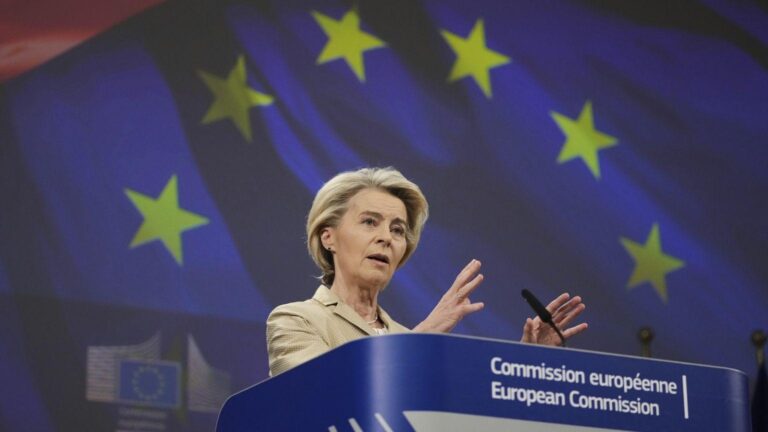The European Union has unveiled a new sanctions package targeting key sectors connected to Russia’s energy and financial networks, including measures aimed at Nord Stream, Russian banks, and oil exports. As the geopolitical tensions escalate, these sanctions mark a significant escalation in the West’s response to Russia’s actions. To help navigate the complexities of the EU’s latest move, we address five critical questions-answered by experts-to clarify what the sanctions entail, their expected impact, and the broader implications for Europe’s energy security and economic landscape.
EU Targets Russian Energy and Finance with Unprecedented Sanctions Plan
The European Union’s latest sanctions package marks a significant escalation in its efforts to curtail Russia’s financial and energy sectors. Targeting key Russian banks and energy exports, the measures aim to diminish Moscow’s ability to finance its ongoing military operations. Among the primary actions is a near-total ban on Russian oil imports by the end of the year, alongside freezing assets of major Russian financial institutions and their subsidiaries within the EU. This approach reflects a coordinated strategy to apply maximum economic pressure while minimizing disruptions within European markets.
Key components of the plan include:
- Phased elimination of Russian crude oil imports by December.
- Expanded blacklists targeting Russian banks with direct connections to sanctioned entities.
- Restrictions on transit of energy materials linked to Nord Stream pipelines.
- Enhanced measures to curb circumvention tactics in financial transactions.
| Sanction Item | Implementation Timeline | Expected Impact |
|---|---|---|
| Russian Crude Oil Ban | By December 2024 | Significant drop in oil revenue |
| Financial Institution Blacklist | Immediate | Restricted access to EU financial systems |
| Nord Stream Transit Restrictions | Q3 2024 | Reduced pipeline operational capacity |
Expert Analysis on the Impact of New Restrictions on Nord Stream Operations and Russian Banks
The latest sanctions targeting the Nord Stream pipeline and Russian banks signify a strategic escalation by the EU aimed at curbing Russia’s economic leverage and energy dominance in Europe. Experts argue that the restrictions will not only delay the resumption of gas flows through Nord Stream but also increase volatility in global energy markets. Financial institutions connected to Russia’s energy sector are particularly vulnerable, as they face limited access to European capital and transaction networks, restricting their operational capabilities. Analysts highlight that while the sanctions are meticulously designed to avoid immediate energy shortages in Europe this winter, they send a clear signal of the EU’s readiness to tighten the noose in response to further aggression.
The broader implications for Russian banks extend beyond simple asset freezes or transaction bans. According to specialists, these measures may accelerate a shift away from the Western financial system, pushing Moscow toward alternative banking partnerships and currencies. Below is a summary of key areas affected by the sanctions:
| Area | Expected Impact | Expert Insight |
|---|---|---|
| Nord Stream Operations | Delay or halt in pipeline repairs and maintenance | Increases pressure on alternative gas routes |
| Russian Banks | Restricted international transactions and funding | Strains liquidity and financing of energy projects |
| Oil Exports | Limitations on EU market access | Potential rise in global oil prices |
- Energy Security: EU diversifies supply sources to mitigate disruptions.
- Economic Pressure: Sanctions create a cumulative financial squeeze on Russia’s key sectors.
- Geopolitical Significance: Moves signal heightened EU-Russia tensions, affecting international diplomacy.
Strategic Recommendations for Allies Navigating the Complex Sanctions Landscape
In light of the EU’s enhanced sanctions targeting Nord Stream and key Russian financial sectors, allies must adopt a multi-layered approach to mitigate risks while preserving strategic interests. First, comprehensive due diligence is paramount-companies and governments alike should rigorously assess their exposure to entities within the scope of the sanctions. Establishing robust compliance frameworks that can rapidly adapt to evolving regulations will reduce inadvertent breaches and foster international cooperation. Moreover, maintaining open channels of communication with EU regulators ensures clarity on enforcement priorities and sanctions updates, enabling stakeholders to navigate uncertainties proactively.
Strategic decision-makers should also emphasize diversifying energy supply chains and financial partnerships to cushion potential supply disruptions or liquidity constraints. This includes investing in alternative energy infrastructure and establishing contingency funding mechanisms. The table below summarizes essential action points for allies facing the sanctions environment:
| Priority | Recommended Action | Expected Outcome |
|---|---|---|
| Compliance | Implement dynamic sanctions screening systems | Reduced risk of violations |
| Communication | Engage regularly with EU regulatory bodies | Up-to-date guidance and swift issue resolution |
| Diversification | Expand energy and financial sourcing options | Enhanced resilience against disruptions |
| Contingency | Develop rapid-response operational plans | Minimized impact from sanctions enforcement |
Closing Remarks
As the EU moves forward with its new sanctions targeting Nord Stream and key sectors of the Russian economy, understanding the implications remains crucial for policymakers, businesses, and observers alike. These five questions, clarified by experts, shed light on the strategic intentions and expected impacts of the measures. As the situation evolves, close attention to both the enforcement and geopolitical responses will be essential to gauge the sanctions’ effectiveness and broader consequences for European energy security and international relations.




